Get to know the doctoral students in WATCH
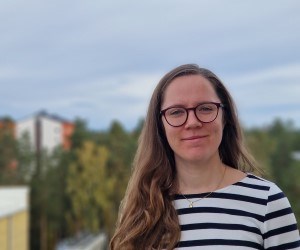
Sofia Hallerbäck – Risk and Environmental Studies, Karlstad University
Place of birth:
Hammarö, Värmland County in Sweden
Field of study:
Risk and environmental studies at Karlstad University, with a focus on nature-based solutions, water scarcity and drought resilience.
What are Sofia’s interests in water issues and planning?
Sofia believes that, ultimately, we cannot achieve sustainable development without tackling water-related issues. “Although we live on a blue planet, we tend to take water for granted”, Sofia says and continues “, Nevertheless, water-related concerns connect us globally, and water connects us with nature as well as with previous and future generations. Furthermore, climate change will in many ways increase water-related risks”.
Skill set and expertise:
Sofia is called “the insider” by the other doctoral students in WATCH since she has worked with related questions in practice for several years. She has an environmental engineering toolbox, loves to collaborate with different fields of knowledge and looks at water-related questions from new perspectives.
Professional background:
Sofia has worked as a consultant at WSP with cloudburst and stormwater in the planning process. More recently, she worked at Karlstad Municipality with water-related questions and collaborations, mainly focusing on the implementation of the EU water framework directive. Previously, Sofia studied environmental engineering at Lund University with a Master's in Sustainable Water Management. Part of her studies were at the University of California Irvine.
Hidden talent:
Sofia loves to paint, especially (off-course) with watercolours.
Read more about Sofia and find her contact details on her personal homepage.
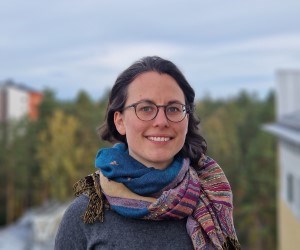
Gisela Horlitz – Environmental Chemistry, Örebro University
Place of birth:
Aachen, Germany
Field of study:
Environmental chemistry at Örebro University. The aim of the project is to investigate how climate change may alter the mobility and fate of organic pollutants in the terrestrial and aquatic environment. Also, the project aims to identify unknowns by non-target mass spectrometry.
What are Gisela’s interests in water issues and planning?
“Modern societies rely on the usage of synthetic chemicals. However, we often learn about the fate of these compounds and potential toxic effects after they are released,” Gisela explains. Thus, she is motivated to understand more about the environmental behaviour of organic chemicals under different environmental conditions, such as under climate change. This understanding might contribute to the sustainable management of chemicals in the future.
Skill set and expertise:
With a background in environmental science, Gisela became interested in analytical chemistry during her Master's studies. She has worked with a variety of organic pollutants in different environmental matrices and with different instruments.
Professional background:
Gisela holds a Master’s degree in Environmental Science from Stockholm University. After graduation, she worked on different research projects connected to organic pollutants and as an analytical chemist in a contract lab. She did a traineeship at the European Chemicals Agency (ECHA) within the Hazard Assessment directorate.
Hidden talent:
In her free time, Gisela enjoys being in nature and long-distance hiking. It is a great way of getting out of the bubble and seeing new perspectives.
Read more about Gisela and find her contact details on her personal homepage.
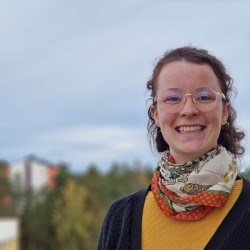
Friederike Küchler – Political Science, Örebro University
Place of birth:
Hamburg, Germany.
Field of study:
Political science at Örebro University, focusing on power relations in participation processes for flood protection. She will especially focus on resistance, refusal, and reworking as power expressions and how citizens use these to influence participation processes. She aims to provide a deeper understanding of these power expressions to facilitate easier and more efficient participation processes for climate change adaptation.
What are Friederike’s interests in water issues and planning?
During her Master’s thesis, Friederike already focused on power relations in climate change adaptation processes regarding flood protection in Halligen, Germany. Her findings support existing research findings that power imbalances and lack of participation can result in maladaptation. Having seen the consequences of lacking participation, Friederike is passionate about making citizen participation more equal, fair, and effective.
Skill set and expertise:
Studying natural science in her Bachelor’s programme has equipped Friederike with an understanding of statistics, GIS, R and basic operations in chemistry and physics labs. Switching to social sciences in her Master’s programme taught her social science research traditions and practical skills like NVivo. Having been in touch with natural and social science research makes it easy for her to communicate with researchers from different disciplines.
Professional background:
Throughout her Bachelor’s studies, Friederike was engaged with Young Friends of the Earth Germany – Brandenburg, both as an executive board member and a member of a bog protection project. Friederike has also worked for a planning bureau, focusing on tourism and town development, in between her Bachelor's and Master’s degrees. In 2023, she worked as the Prokurator Ekonomi for Kalmar Nation, organizing student life in Lund.
Hidden talent:
According to her parents, Friederike did not have to learn how to ride a bike. She just got on the bike and was able to ride it.
Read more about Friederike and find her contact details on her personal homepage.
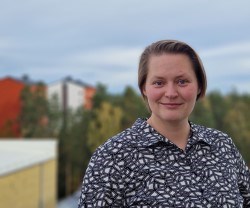
Julia Schneider – Human Geography, Örebro University
Place of birth:
Fjugesta, Lekeberg, Örebro County in Sweden
Field of study:
Human geography at Örebro University, and more specifically, the governance and planning of the land-sea interface, particularly in urban waterfronts. She wants to find ways to expand city planning out into the water to better care for important aquatic environments and species.
What are Julia’s interests in water issues and planning?
During several summers, Julia worked at the Marine Knowledge Center in Malmö, getting to know and then show the life below water in Öresund through guided netting and snorkelling with groups of children. Together with her Master’s in Urban Development, this job positioned her with one foot on land and one in the water, wanting to bridge gaps between planning on land and in the sea.
Skill set and expertise:
Julia brings a landscape perspective to WATCH, with particular attention to the governance and management of public spaces. Her background as a research assistant has honed her writing and analytical skills. In addition to this, she has developed knowledge of children’s outdoor environments.
Professional background:
Julia has a Bachelor’s in Environmental Studies from Malmö University and a Master’s in Sustainable Urban Development from the Swedish University of Agricultural Sciences (SLU), where she also worked as a research assistant in the Department for Landscape Architecture, Planning and Management.
Hidden talent:
Apart from her academic background, Julia is also a trained pastry chef and can ride one-wheelers.
Read more about Julia and find her contact details on her personal homepage.
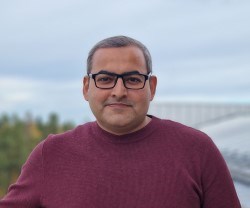
Ali Shah – Human Geography, Karlstad University
Place of birth:
City of Peshawar, Pakistan
Field of study:
Human geography at Karlstad University, specialising in environmental risk and human security.
What are Ali’s interests in water issues and planning?
Ali's passion for water issues is driven by his experiences in environmental conflict-prone regions, highlighting the vital connection between water management, security, and development.
Skill set and expertise:
With expertise in human security, and GIS/RS Mapping Analysis, Ali Shah brings a unique perspective to WATCH research objectives.
Professional background:
Ali holds a Master's in Geography of Environmental Risk and Human Security. He has previous experience of working in research, including a position as a fellow in peace research and conflict-sensitive employment.
Hidden talent:
Ali is multilingual and is fluent in English, Urdu, Hindi, Punjabi, Hindko and Pashto, and has a good grasp of German and several other regional languages.
Read more about Ali and find his contact details on his personal homepage.
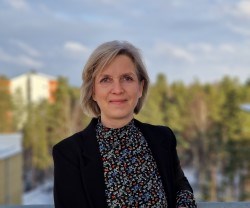
Helena Römmelmann – Sociology, Örebro University
Place of birth:
Kristinehamn, Värmland county in Sweden
Field of study:
Sociology at Örebro University.
What are Helena’s interests in water issues and planning?
Helena's research interest is water in relation to the concept of “rights of nature” as a step towards sustainable transformation of society. She is curious about transformative research and feels deeply about environmental and social justice issues related to climate change.
Skill set and expertise:
Helena works with a holistic view of people and environments. She is a generalist and knowledgeable about vulnerable groups and how society functions at different levels, both in Sweden and from an international development context. She did her Master's thesis in Cape Town, South Africa, about food security, focusing on social risks related to climate change. She prefers working with qualitative research methods.
Professional background:
Helena has a background as a social work practitioner working in a municipality and at a government agency. In recent years, she returned to the university to study a 2-year Master's programme in Societal Risk Management at Karlstad University. She has worked as a research assistant at both Karlstad and Örebro University in various international and national projects on a wide range of topics, from disaster risk management and flooding to (un)sustainable consumption.
Hidden talent:
Helena loves the outdoors and music. If you can't find her, she's probably off playing the flute with her musical friends.
Read more about Helena and find her contact details on her personal homepage.
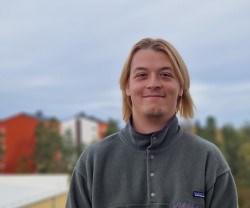
Jonas Zetzsche – Biology, Örebro University
Place of birth:
Born in Düsseldorf, Germany and moved at an early age to the south of Germany.
Field of study:
Biology in the field of ecotoxicology at Örebro University. Here, he's looking at the impact of climate change on chemical pollution in the context of multiple stressors.
What are Jonas’ interests in water issues and planning?
His interest in water issues comes from a deep-rooted passion for the ocean and open water. Looking at chemical pollution in aquatic ecosystems is one small contribution to protecting this precious resource.
Skill set and expertise:
After upper secondary school and several times during his university career, he spent time outside of Germany and Europe. The desire to work in the world of research grew with every stay in a different country, collecting different experiences and perspectives. Being part of an international workgroup and participating in environmentally relevant research topics became a goal. Research in the field of water never left the back of his mind.
Professional background:
Jonas studied water resources management and environmental sciences with a focus on biology and hydrology, giving him a broad understanding of the water sector and its related issues. In a one-year internship at the Örebro University, he worked on the transgenerational effects of PFAS using the zebrafish model. Inside the project, phenotypical as well as molecular alterations were observed, even in previously unexposed fish.
Hidden talent:
Jonas likes to be active and spend time outside and with friends and family. Even some of his hobbies, such as surfing, swimming, and snorkelling, are water-related.
Read more about Jonas and find his contact details on his personal homepage.
